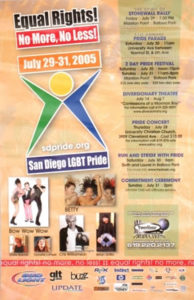One of the biggest crises in San Diego Pride’s history took place in 2005 when anti-gay/ex-gay crusader James Hartline released to the press that his research had indicated that two of the volunteers for Pride were registered sex offenders. The revelation kick-started a series that engulfed the community and threatened the very foundation of the Pride organization. It was exacerbated by some members of the press who fanned the flames of controversy, dividing the community and doing Hartline’s work for him.
Controversy
Hartline was an “ex-gay” crusader with a felony record who spent 20 years in prison and jail and many years immersed in the sex- and drug-culture and who became HIV+ as a result. He believed that God would cure him of HIV and had supposedly been cured of his homosexuality.
After Hartline’s initial findings were released to the media, it was later found out that another volunteer and one staff member were also registered sex offenders. When the Pride Board of Directors and staff learned of this, they sought out legal advice. After consulting with government agencies, including the FBI and the Police, Pride chose to let the four people in question remain with Pride as they were advised that they were not a threat to Pride attendees.
It was a balancing act between an individual’s right to privacy and their legal rights against discrimination, the interests of Pride and a community’s desire to know.
On the one hand, the individuals who had been discovered to have committed sex offenses in the past via the Meagan’s Law website, had legal rights. The law is very specific about how that information is allowed to be used and there are protections in place to prevent unwarranted discrimination of those individuals. Furthermore, none of the four had reoffended in the years since.
On the other hand, certain members of the press vilified the Board and staff, not only for the decision to allow the people in question to remain with Pride, but for not performing criminal background checks on all staff and volunteers in the first place. This is despite the fact that background checks were not common practice among any of the community organizations at the time either.
In the end, the issue never seemed to gain traction among the community at large. Pride went on as scheduled with record numbers of people attending the events. After the event, a town hall meeting was called at the Center by the members of the community who were calling for a clean sweep of the Pride organization. At the meeting, things turned ugly as the moderator of the event lost control of the conversation, but the Update newspaper estimated that 80 percent of those present supported Pride’s actions and behavior.
In the final analysis, the scrutiny and criticism from vocal members of our community had a big effect on the Pride organization that was run by an unpaid Board, numerous volunteers, and a few staff members. Executive Director Suanne Pauley, many members of the Board of Directors, and a number of staff and volunteers resigned.
The Show Must Go On
The Friday night rally was moved from the Organ Pavilion to the main stage at the festival. Awards were given, speeches were made and proclamations were given. Toni Atkins, Big Mike Philips and Todd Gloria were among the speakers that evening.
The parade the following morning included a particularly excellent float by the Center, the usual stunning display by Rich’s, an elaborately themed entry by Bacchus House and marching contingents, such as the “Flaggots,” who came all the way from Ohio.
At the festival, not much had changed from previous years, although a few of the dance floors and beverage gardens were rearranged. It continued to be an event that attracted a more and more diverse LGBT population as members of the community started families and had children.
The entertainment lacked a big name draw that had been present in some previous years, but community favorite Bow Wow Wow headlined the event. The previous year’s experiment with a separate concert after the festival on Sunday failed to catch on with the community and was not repeated.
Marching On
After the events of 2005, Pride was faced with the challenge of finding a new Executive Director, replacing lost Board members and instituting a way to screen the hundreds of volunteers every year.
